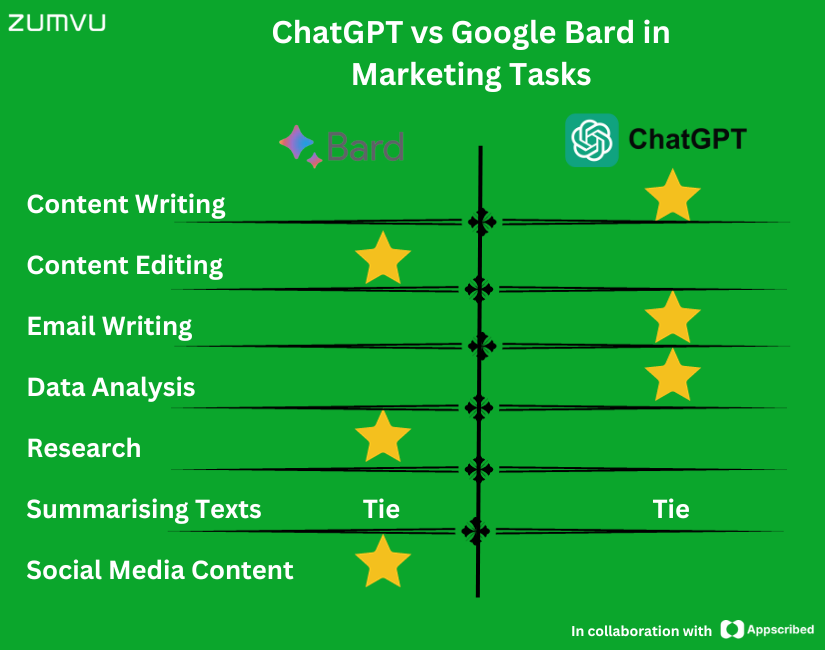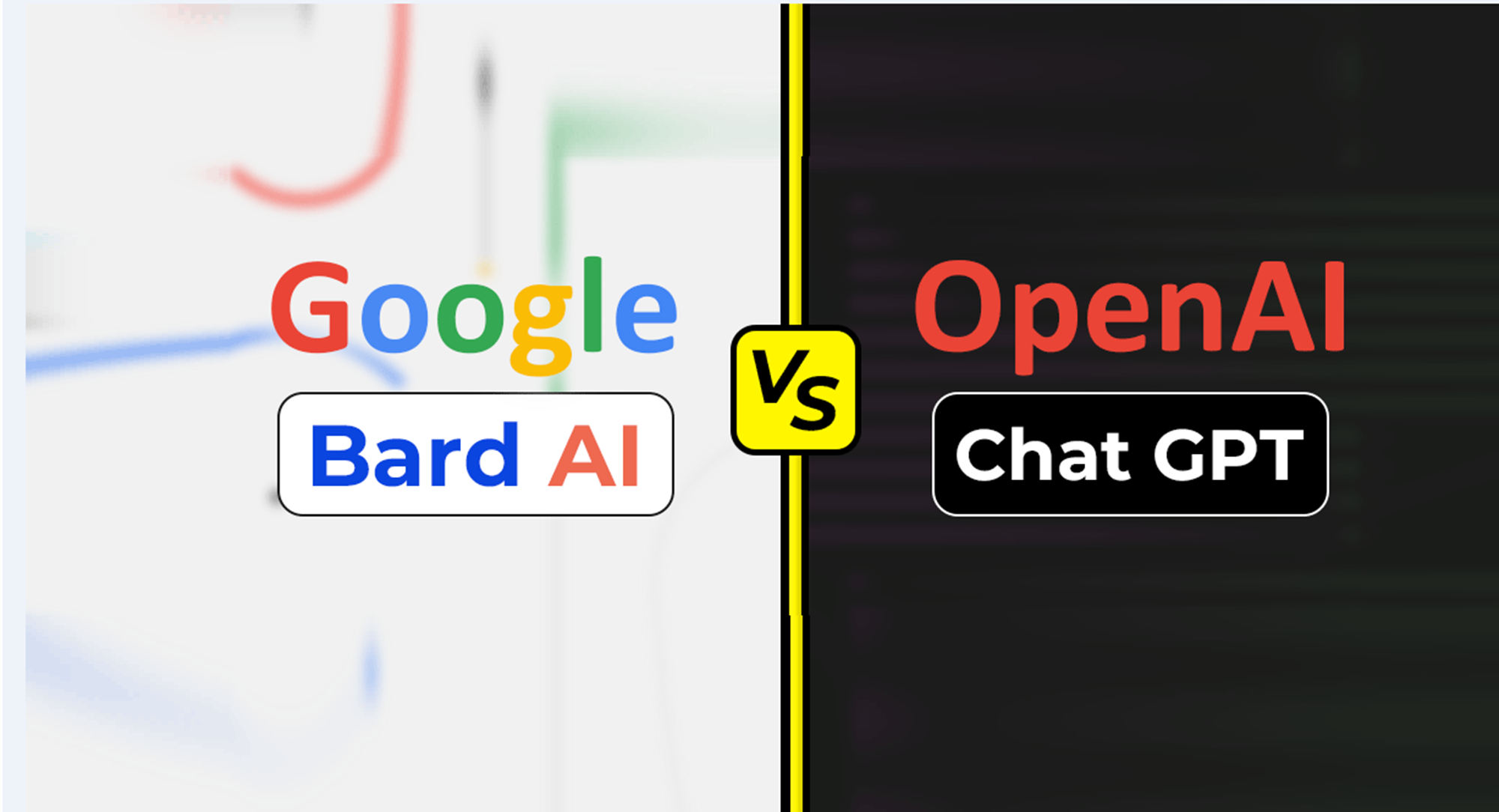Artificial intelligence has undergone remarkable changes in recent years. Businesses are using AI integration increasingly to automate their business processes and other relevant tasks. With ChatGPT and Bard being the leading AI platforms in 2023, it has become challenging to differentiate the characteristics and output they can provide to a business model. Thus, deciding on the right AI chatbot for automating your marketing agendas can feel like a daunting task.
Instead of doing a full comparison of ChatGPT vs Bard, this article will focus on highlighting their abilities in automating various marketing tasks such as content writing, email crafting, data analysis, and beyond.
Note: We have compared ChatGPT 3.5 with Google Bard’s version with all the latest information available in October 2023.
Key Takeaways
- ChatGPT and Google Bard are two powerful AI chatbots that can automate various marketing tasks such as content writing, email crafting, data analysis, and social media planning.
- ChatGPT is better at generating creative content and writing professional emails, while Google Bard excels in research tasks and providing human-like responses.
- Both chatbots have their strengths and weaknesses in different marketing tasks, so the choice between them depends on the specific needs of your business.
- It's important to carefully evaluate your requirements before deciding which chatbot is the best fit for automating your marketing tasks.
Difference in Technology of ChatGPT and Google Bard
ChatGPT and Google Bard use different tech. OpenAI made ChatGPT can provide information on a number of things. However, it is not as good as Bard when it comes to answering certain questions. On the other hand, Google created Bard, an AI bot which relies on information from Google Search and processes information better than ChatGPT.
The difference between these bots lies in their codes. Each of these AI platforms use a different approach to provide output for the prompts and help us with tasks. However, the major difference between Google Bard and ChatGPT is; Bard provides human-like responses and has more relevant and current information. Whereas, ChatGPT is good with processing texts and is effective when it comes to data summarization and other related tasks. Reason for Bard being relevant and updated is due to its ability to fetch real-time data from Google's search engine. Mentioned below are the potential differences between ChatGPT and Google Bard:
Elements | ChatGPT | Google Bard |
Data Extraction | As of today, ChatGPT employs a data model which was last updated in 2021 on the free version. | Bard uses current information which is extracted from current data available over the internet. |
| Language Models | Employs a GPT 3.5 and GPT-4 model | Uses the LaMDA model. |
Automating Marketing Tasks: ChatGPT vs Google Bard
Businesses currently employ AI tools like ChatGPT and Google Bard to help with many marketing tasks. With the help of AI integration, businesses are able to write content, edit it, and even send emails whenever necessary. Both the models can analyse a given set of data and further process it to create a meaningful outcome. Ability to understand and comprehend a given set of data is crucial when you need to know what the numbers mean for your business.
In terms of research, ChatGPT provides better results when compared to Bard as ChatGPT can analyse and highlight the important facts and key aspects quicker. Bard, on the other hand, has the ability to curate responses which are more appealing for the human counterpart. Bard provides the user with a current and updated version of information which is crucial for the functioning of a business.
Businesses can benefit from both of the AI platforms when it comes to making an outline for a social media campaign. Both of the AI platforms can help with curating quality content for social media campaigns, however the process differs for each platform. Based on their design features, each one comes up with novel ideas suited to your brand's image.
As stated earlier, Google Bard generates responses which sound human. Thus, when it comes to preparing email campaigns, Bard is more efficient when compared to ChatGPT. Bard can help with content for email which is updated following the current trends of the market which is crucial when it comes to email campaigns.
Here is a summary of the comparison and who won it:
Content Writing
Each of the models work well with prompts you provide in regards to your business agendas. However, there are certain strengths and weaknesses of each of the models which have been highlighted in the section below:
Parameters | Google Bard | ChatGPT |
Strengths |
|
|
Weaknesses |
|
|
ChatGPT and Bard are both great tools for content writing. They can write short pieces like product descriptions or social media captions. Even email newsletters and FAQs are no match for them. However, as we need a more creative approach for writing, ChatGPT wins in Content Writing.
Content Editing
Content editing is an essential task in marketing, and both ChatGPT and Google Bard can assist with automating this process. They can help to proofread and improve existing content by suggesting edits, checking for grammar errors, and enhancing clarity.
Parameters | Google Bard | ChatGPT |
Strengths |
|
|
Weaknesses |
|
|
With ChatGPT's efficiency in generating text requests and summarising information, it becomes an effective tool for content editing tasks. Additionally, Google Bard also offers reliable support in refining the quality of written material.
As most content editors have to proofread the content, before publishing and presenting content in a better way, Google Bard seems like a better tool for this task.
Email Writing
ChatGPT and Google Bard can both be used to automate email writing tasks in marketing. ChatGPT is particularly useful when it comes to crafting personalised and engaging emails, as it excels at generating creative content and coming up with unique ideas.
| Parameters | Google Bard | ChatGPT |
Strengths |
|
|
Weaknesses |
|
|
Google Bard, on the other hand, is better suited for automating the process of writing generic or templated emails that require minimal customization. With its ability to execute repetitive tasks efficiently, Bard can help save time in composing standard emails or responses.
But as you need engaging writing for emails, ChatGPT gets a point here.
Data Analysis
ChatGPT and Google Bard differ in their capabilities when it comes to data analysis for automating marketing tasks. ChatGPT is commonly used for data analysis, but both AI chatbots have different strengths and weaknesses in this aspect.
| Parameters | Google Bard | ChatGPT |
Strengths |
|
|
Weaknesses |
|
|
They both offer unique ways of providing relevant information and generating creative content, including data analysis.However, as ChatGPT provides API and can be integrated with third party analysis app, this point goes to ChatGPT. Moreover, the focus of Data Analysis is to communicate complex data in a clear way, which ChatGPT does better here.
Research
Both ChatGPT and Google Bard can assist with research tasks in marketing automation. ChatGPT's strong text processing capabilities make it useful for conducting general online research, gathering information, and providing relevant responses.
| Parameters | Google Bard | ChatGPT |
Strengths |
|
|
Weaknesses |
|
|
Google Bard is designed specifically for research purposes and has access to real-time information, giving it an advantage in accuracy when providing answers. With its ability to analyse vast amounts of data quickly, Bard can gather insights and generate reports efficiently.
Hence, Google Bard wins here.
Summarising Texts
ChatGPT and Google Bard are both capable of generating text summaries efficiently. They can handle complex data and condense it into concise summaries. ChatGPT is particularly good at creating creative and informative content, paraphrasing, and summarising text requests.
| Parameters | Google Bard | ChatGPT |
Strengths |
|
|
Weaknesses |
|
|
On the other hand, Bard excels at answering questions with relevant information.
Both AI chatbots offer valuable features for automating marketing tasks related to summarization. Hence, we can safely say this one is a tie.
Social Media Content
Both AI chatbots, ChatGPT and Google Bard can be incredibly helpful in automating social media planning for businesses. These advanced technologies have the ability to analyse data, research trends, and summarise information, which are all essential components of effective social media strategies.
| Parameters | Google Bard | ChatGPT |
Strengths |
|
|
Weaknesses |
|
|
With AI chatbots, companies can save time and effort by letting them handle tasks such as scheduling posts, creating content calendars, and even writing engaging captions. By utilising these chatbots for social media planning, businesses can streamline their processes and ensure a consistent online presence without much manual intervention.
Social media posts needs both - creative content and fresh content. Although ChatGPT is more creative than Google Bard, as of now, it does not have access to real time data. Google Bard can access fresh content from the internet and provide you better social media content along with trending hashtags.
Hence, Google Bard wins here.
Best of ChatGPT and Google Bard in each Marketing Task
We will now be comparing ChatGPT and Google Bard in terms of their efficacy in marketing tasks. The comparison is provided in the table below.
| Marketing Tasks | ChatGPT | Google Bard |
| Content Writing | Efficient at generating creative content. | Can write human-like responses. |
| Content Editing | Capable of grammar check and basic content editing. | Proofreads content and great at presenting it better when given prompts. |
| Email Writing | Capable of writing professional emails. | Can handle email writing with a more personal touch. |
| Data Analysis | Good at Data Analysis when integrated with external apps. | Can surface relevant data from Google Search but limited analysis possible. |
| Research | Can generate summary of research requests. | Primarily built for research purposes including surfacing relevant information from Google Search. |
| Summarise | Excels at summarising text requests. | Excels at summarising text requests. |
| Social Media Planning | Can generate creative content for social media. | Can provide current, relevant information for social media posts. |
This table makes it clear that both AI systems have their strengths and weaknesses when it comes to handling various marketing tasks, making the selection between ChatGPT and Google Bard based on the specific needs of the task at hand.
When it comes to automating marketing tasks, ChatGPT and Bard each have their strengths. While ChatGPT is better at writing content and email messages, Bard excels in research and summarization.
Thus, choosing between these two platforms depends on the specific marketing tasks you need to automate. It's important to evaluate your requirements carefully before deciding which AI chatbot is the best fit for your needs.
FAQs
1. What is the difference between ChatGPT and Bard?
ChatGPT and Bard are both AI chatbots, but they differ in terms of their training data and capabilities. ChatGPT is trained on a wide range of internet text, while Bard is specifically trained on books, stories, and plays.
2. Which AI chatbot is better for automating marketing tasks?
Both ChatGPT and Bard can be used for automating marketing tasks, but it depends on the specific needs of your business. ChatGPT may be more suitable for general customer interactions, while Bard's literary knowledge may be helpful for creative copywriting.
3. Can these chatbots handle complex marketing strategies?
Yes, both ChatGPT and Bard have the potential to handle complex marketing strategies as they can generate human-like responses based on their training data. However, it's important to fine-tune them according to your specific requirements.
4. Are there any limitations to using these AI chatbots for marketing tasks?
While advanced AI chatbots like ChatGPT and Bard have made significant progress in natural language understanding, they still have limitations such as occasional generation of incorrect or nonsensical responses that need human supervision.
5. How do I choose between ChatGPT and Bard for my marketing automation needs?
To choose between ChatGPT and Bard for your marketing automation needs, consider factors like the type of content you want generated (general or literary), target audience preferences, integration capabilities with existing systems/platforms, cost considerations etc.,


 Table of Content
Table of Content










